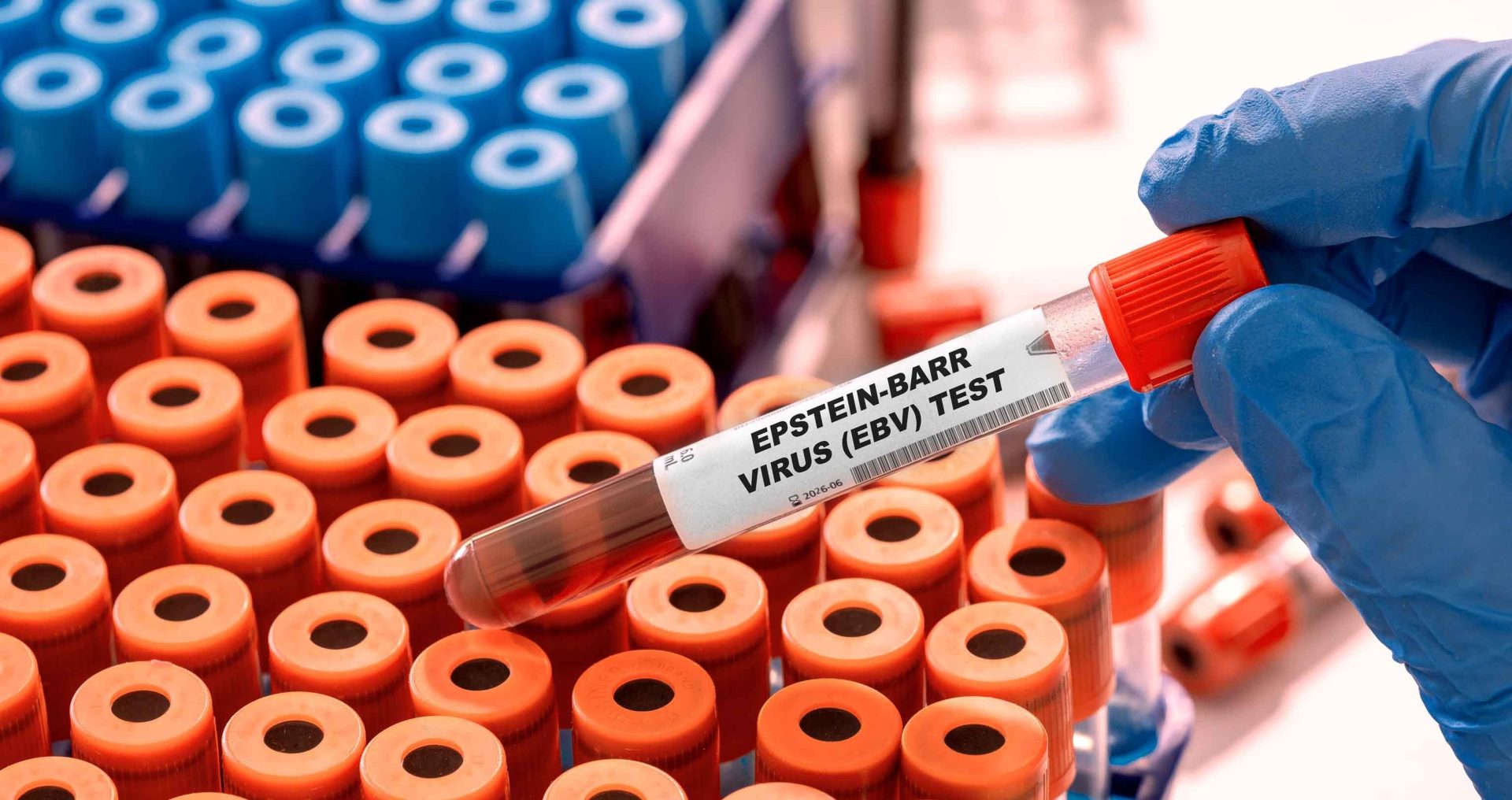Feeling constantly exhausted, battling recurring sore throats, or struggling with unexplained symptoms that doctors can’t quite pinpoint? The culprit might be hiding within your own cells. Epstein-Barr virus (EBV), one of the most common viruses worldwide, infects approximately 90 percent of adults globally, yet many people remain unaware of its presence or its potential impact on their health.
How Epstein-Barr silently enters your system
Epstein-Barr virus belongs to the herpesvirus family and spreads primarily through saliva, earning its reputation as “the kissing disease.” However, sharing drinks, food, or even personal items can also transmit the virus from person to person. Most people contract EBV during childhood or adolescence, often experiencing mild symptoms that mimic common colds or experiencing no symptoms at all.
The virus’s stealthy nature allows it to establish itself in your body without detection. Once infected, the virus targets your B lymphocytes—white blood cells crucial for immune function—and establishes lifelong latency. This means that even after any initial symptoms subside, the virus remains dormant in your cells potentially for the rest of your life.
6 warning signs that Epstein-Barr is actively affecting you
While many people carry the virus without issue, EBV can reactivate during periods of stress, immune suppression, or for reasons scientists still don’t fully understand. When active, the virus may trigger various symptoms that affect your daily functioning:
- Persistent fatigue that doesn’t improve with rest or sleep
- Recurrent sore throats and swollen lymph nodes in your neck
- Unexplained muscle and joint pain throughout your body
- Cognitive difficulties including brain fog, memory problems, and trouble concentrating
- Recurring headaches that don’t respond to typical treatments
- Low-grade fever that comes and goes unpredictably
These symptoms often mimic other conditions, making EBV particularly difficult to diagnose. Many patients report visiting multiple healthcare providers before receiving proper testing and diagnosis.
The connection between Epstein-Barr and serious health conditions
Recent research has uncovered concerning links between Epstein-Barr virus and several chronic health conditions. Scientists at Harvard Medical School found compelling evidence connecting EBV infection to the development of multiple sclerosis (MS). Their groundbreaking study demonstrated that EBV infection increased the risk of developing MS by 32-fold, suggesting the virus may be the leading cause of this debilitating neurological condition.
Additionally, emerging research indicates potential connections between Epstein-Barr virus and other autoimmune conditions including lupus, rheumatoid arthritis, and certain types of thyroid disorders. The virus may trigger immune system dysfunction that leads the body to attack its own tissues.
Some researchers also believe EBV may play a role in the development of certain cancers, including Hodgkin lymphoma, Burkitt lymphoma, and nasopharyngeal carcinoma. The virus’s ability to manipulate immune cells and their genetic material creates conditions that potentially promote cancer development in susceptible individuals.
Why diagnosing active Epstein-Barr remains challenging
Despite being one of the most common viral infections worldwide, identifying active Epstein-Barr virus presents significant diagnostic challenges. Standard blood tests can confirm whether someone has been exposed to the virus in the past but often fail to accurately determine whether the virus is currently active and causing symptoms.
Many healthcare providers rely on antibody testing, which measures your immune response to the virus rather than directly detecting viral activity. While elevated antibody levels can suggest recent infection or reactivation, they don’t always correlate perfectly with symptoms or disease severity.
More sophisticated testing methods such as polymerase chain reaction (PCR) tests measure viral DNA in the blood, providing a more direct assessment of viral activity. However, these tests aren’t routinely ordered unless a doctor specifically suspects EBV as the cause of symptoms.
This diagnostic uncertainty often leads to frustration for patients experiencing debilitating symptoms without clear explanation or effective treatment pathways.
How Epstein-Barr damages your immune system
Once EBV enters your body, it employs sophisticated mechanisms to evade detection and establish persistent infection. The virus targets B cells—crucial components of your adaptive immune system—and reprograms them to serve as viral factories. This not only compromises immune function but creates a reservoir for the virus to persist indefinitely.
During active infection or reactivation periods, the virus triggers inflammatory responses throughout your body. This inflammation, while intended to fight the infection, can damage tissues and organs when prolonged. Many EBV-related symptoms, including fatigue and pain, stem directly from this inflammatory cascade.
The virus also interferes with normal immune signaling, potentially contributing to the development of autoimmune conditions. By altering how immune cells communicate and function, EBV may cause your immune system to mistakenly attack your own healthy tissues.
Treatment approaches that might finally bring relief
While no specific antiviral treatment has been approved explicitly for chronic or reactivated Epstein-Barr infection, several therapeutic approaches may help manage symptoms and support recovery:
Antiviral medications such as valacyclovir, although not FDA-approved specifically for EBV, have shown promise in reducing viral activity in some patients. These medications work by interfering with viral replication, potentially reducing the viral burden in the body.
Immune-supporting therapies focus on strengthening natural defenses against the virus. Some healthcare providers recommend supplements including vitamin C, vitamin D, zinc, and lysine to support optimal immune function, though research on their effectiveness specifically against EBV remains limited.
Anti-inflammatory protocols targeting diet and lifestyle factors aim to reduce the inflammatory burden caused by the virus. Eliminating inflammatory foods, increasing consumption of antioxidant-rich vegetables and fruits, and incorporating natural anti-inflammatory compounds like turmeric and omega-3 fatty acids may help manage symptoms.
Stress management techniques including meditation, gentle movement practices, and adequate rest play crucial roles in recovery. Chronic stress depletes immune resources and may trigger viral reactivation, creating a vicious cycle of illness.
Promising research offering new hope
Medical researchers continue investigating novel approaches to treating Epstein-Barr virus. Several clinical trials are exploring targeted antiviral therapies designed specifically to combat EBV infection. These next-generation antivirals aim to more effectively suppress viral replication while causing fewer side effects.
Immunotherapy approaches, similar to those revolutionizing cancer treatment, show promise for EBV-related conditions. By enhancing the immune system’s ability to recognize and eliminate virus-infected cells, these therapies could potentially clear active infection more effectively than current treatments.
Vaccine development for EBV has gained momentum in recent years. Unlike therapeutic treatments that address existing infection, an effective vaccine could prevent initial infection altogether. Several candidate vaccines are currently in development, with some already entering early-phase clinical trials.
Protecting yourself from Epstein-Barr exposure
While preventing exposure to such a ubiquitous virus proves challenging, certain precautions may reduce your risk of contracting EBV or experiencing reactivation:
Practice proper hygiene, especially during adolescence when risk of symptomatic infection increases. Avoid sharing drinks, food, or personal items that may transmit saliva, particularly with someone experiencing active symptoms.
Strengthen your immune defenses through regular physical activity, adequate sleep, stress management, and nutritious diet. A robust immune system better controls viral infections, potentially preventing symptomatic disease even after exposure.
Consider proactive testing if you experience persistent unexplained symptoms that align with EBV infection. Early identification allows for targeted interventions before the virus triggers more serious complications.
Advocate for yourself within healthcare settings if you suspect EBV might explain your symptoms. Request comprehensive testing and seek providers familiar with the complexities of diagnosing and treating persistent viral infections.
As scientific understanding of Epstein-Barr virus continues evolving, new prevention and treatment strategies will likely emerge. In the meantime, awareness of this common but potentially serious infection represents an important step toward addressing unexplained health issues affecting millions worldwide.













